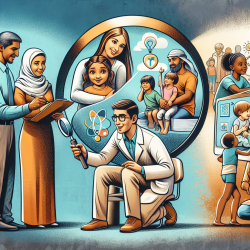Introduction
In the realm of speech-language pathology, practitioners are continually seeking innovative approaches to enhance child outcomes. One emerging area of interest is the intersection of spiritual network support systems and epigenomic modulation. A recent study titled "Implication of Spiritual Network Support System in Epigenomic Modulation and Health Trajectory" provides intriguing insights into how spiritual activities might influence gene expression and, consequently, health outcomes. This blog explores how these findings can be applied in practice to foster better outcomes for children.
The Power of Spiritual Network Support Systems
Spiritual network support systems (SNSS) encompass activities like prayer, meditation, and communal religious practices. These activities are more than just cultural or religious expressions; they are powerful psychosocial conditions that can modulate gene expression. The study highlights that SNSS can down-regulate the conserved transcriptional response to adversity (CTRA) gene and appropriately express the NR3C1 gene, which are crucial for managing stress and promoting health.
Epigenomic Modulation: A Key to Health
Epigenomic modulation refers to changes in gene expression that do not involve alterations to the underlying DNA sequence. These changes can be influenced by various environmental factors, including social and spiritual environments. The study suggests that spiritual activities can lead to normal epigenomic modulation, which is associated with reduced pro-inflammatory cytokines and improved health outcomes.
Applying These Insights in Practice
For practitioners in speech-language pathology, integrating spiritual network support into therapeutic interventions could be a game-changer. Here are some practical steps to consider:
- Encourage Participation in Spiritual Activities: Encourage children and their families to engage in spiritual or meditative practices that resonate with them. This could include prayer, meditation, or other forms of spiritual expression.
- Incorporate Mindfulness and Meditation: Introduce mindfulness and meditation techniques in therapy sessions to help reduce stress and promote a sense of well-being.
- Collaborate with Spiritual Leaders: Work with local spiritual leaders to create supportive environments that foster spiritual growth and community support.
Encouraging Further Research
While the current data is promising, more research is needed to fully understand the mechanisms by which spiritual network support systems influence gene expression. Practitioners are encouraged to collaborate with researchers to explore this area further, potentially leading to new therapeutic approaches and interventions.
Conclusion
Incorporating spiritual network support systems into therapeutic practices offers a novel approach to improving child outcomes. By leveraging the power of spiritual activities to modulate gene expression, practitioners can help children achieve better health and developmental outcomes. As we continue to explore this fascinating intersection of spirituality and science, the potential for transformative impacts on child health and well-being is immense.
To read the original research paper, please follow this link: Implication of Spiritual Network Support System in Epigenomic Modulation and Health Trajectory.










